In this edition of the Court judgements review, we look at the SC directions regarding details to be contained in Police Reports filed before magistrates after the investigation of criminal cases, Madhya Pradesh HC order that police protection cannot be given for longer period to private persons, even if it had involved threat of life, Karnataka HC order that an Accused who is Acquitted of Charges made against is entitled to anonymity of his name in the Digital Records, as a matter of Right to Live with Dignity.
SC: Issues important directions regarding details to be contained in Police Reports filed before magistrates after the investigation of criminal cases
In the case of Dablu Kujur vs. The State of Jharkhand, the Supreme Court (SC) was dealing with the bail application filed by the accused in the commission of crimes under Section 302, 120-B of the Indian Penal Code (IPC) and Section 25 of Arms Act (AA). The court dismissed the bail application by holding that it is not inclined to do so, since the trial of the case in the fag end.
In the same case, the SC has also issued several important directions on the information and details to be contained in the report filed by the police officers before the competent magistrates after the completion of the crime investigations under section 173 of the Code of Criminal Procedure (CrPC), while referring to its earlier order dated 17 July 2023, wherein it had observed that the chargesheets filed by the police of Jharkhand, Bihar and Uttar Pradesh did not contain the necessary details in accordance with section 173 of the CrPC.
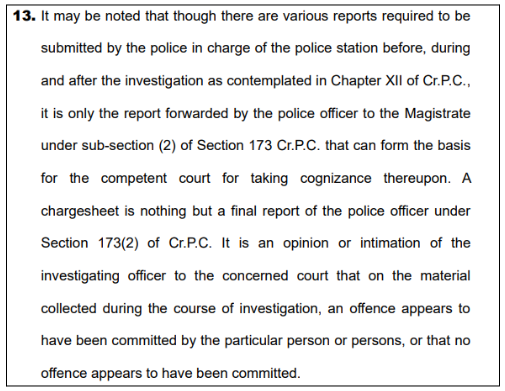
Accordingly, the SC issued the following directions on the information to be contained in the police reports filed under section 173 of CrPC and ordered strict compliance by the Police.
- A report in the form prescribed by the State Government stating –
- the names of the parties
- the nature of the information
- the names of the persons who appear to be acquainted with the circumstances of the case
- whether any offence appears to have been committed and, if so, by whom
- whether the accused has been arrested
- whether he has been released on his bond and, if so, whether with or without sureties
- whether he has been forwarded in custody under section 170.
- Whether the report of the medical examination of the woman has been attached where the investigation relates to an offence under [sections 376, 376A, 376AB, 376B, 376C, 376D, 376DA, 376DB]or section 376E of the Indian Penal Code (45 of 1860)
- If upon the completion of the investigation, there is no sufficient evidence or reasonable ground of suspicion to justify the forwarding of the accused to a Magistrate, the Police officer in charge shall clearly state in the Report about the compliance of Section 169 CrPC.
- When the report in respect of a case to which Section 170 applies, the police officer shall forward to the Magistrate along with the report, all the documents or relevant extracts thereof on which the prosecution proposes to rely other than those already sent to the Magistrate during investigation; and the statements recorded under Section 161 of all the persons whom the prosecution proposes to examine as its witnesses.
- In case of further investigation, the Police officer in charge shall forward to the Magistrate a further report or reports regarding such evidence in the form prescribed and shall also comply with the details mentioned in sub paras (1) to (3).
Madhya Pradesh HC: Police Protection cannot be given for longer period to private persons, even if it had involved threat of life
In the case of X vs. Y, the Madhya Pradesh High Court (HC) was dealing with a writ petition filed by two businessmen, who are brothers and are engaged in the business of Real Estate in the City of Gwalior. The facts of the case were that in the year 2005, the petitioners had sought police protection from the Superintendent of Police (SP) with the claim that they had received threats of extortion from miscreants, after which the police protection was given to them. Subsequently, the petitioners and their sons were attacked. The son of Petitioner No. 2 was killed, whereas Petitioner No. 1 had survived because of the gunman provided to him and Petitioner No. 2 was the witness of the incident. In the year 2007, the accused were convicted and sentenced to life imprisonment. However, the police protection continued to be given to the petitioners. In the year 2008, the SP had sought to remove police protection for petitioners, citing the non-payment of required fees for the police protection to the petitioners. However, it continued for 3 more years and was eventually removed in the year 2011. Subsequently, the petitioners have filed the Writ Petition in HC seeking police protection. In its interim order dated 6 January 2012, the HC had directed the police department to give the police protection until the next date of hearing. Thereafter, the matter did not come up for hearing for several years and was heard in the year 2023. During all these years, the police protection was continued to be given to the petitioners.
When the matter was taken up, the HC noted that all the miscreants responsible for the attack were already sentenced to life imprisonment in accordance with the law and that no other threat against petitioners exists. In addition, the petitioners also have 3 private licensed guns with them. Further, the court noted that the petitioners did not pay the requisite fee which was supposed to be paid to the police department for providing police services to them.
Therefore, the HC dismissed the plea for grant of police protection by noting that it is neither a constitutional nor a statutory right of petitioners to enjoy continuation of police protection. The police are for the protection of common people such as the poor, whistle-blowers, women facing harassment, eve teasing, etc., The core duties of police are crime investigation and tacking law and order, which would take a backseat if they were given for service of superfluous claims made by petitioners. But, against the Spirit of the Constitution, petitioners have enjoyed the free services of policemen all through from 2012, and even without paying any amount of fee. Accordingly, the court dismissed the petition and ordered for arrears amount of Rs. 2,55,64,176 rupees to be paid to the police department.
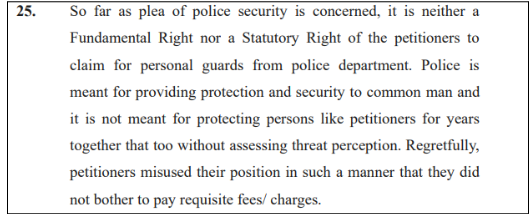
J & K HC: Approaching Sessions Court first for Anticipatory bail is preferrable, though the concurrent jurisdiction exists with HC
In Mohd. Shafi Masi vs. Union Territory of J&K, the HC of Jammu and Kashmir and Ladakh dismissed an application for Anticipatory Bail by stating that it is preferable to approach the session court first for the same relief, though the concurrent jurisdiction vests with the high courts as well. The court relied on the numerous orders which various HCs have already passed on the same issue. Particularly, the court noted that in Smt. Manisha Neema vs. State of M.P. (2003 (2) MPLJ 587), the Madhya Pradesh HC has held that approaching the lower court i.e. Sessions Court first gives an advantage to the HC to appraise itself on the grounds which have been considered by the session court. Further, in Smt. Savitri Samso vs. State of Karnataka (2001 CriLJ 3164), the Karnataka HC held that applications for Anticipatory Bails should be filed before the Sessions Court first unless sufficient cause for not approaching the same court is made out before the HC. Similarly, the J& K HC in Rouf Ahmad Mir v. SSP and Anr had held that HC can entertain Anticipatory Bail applications before they were filed in the Session Courts if only rare, exceptional, and unusual circumstances exist.
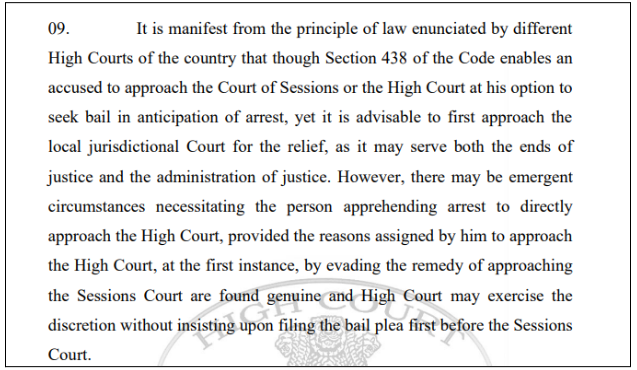
By taking note of catena of other judgments that have held a similar position, the HC held that there is nothing on record that shows circumstances or compelling reasons that have prevailed in the case before it to skip over the jurisdiction of Sessions Court and approach the High Court directly. Accordingly, it dismissed the Anticipatory Bail Application.
Karnataka HC: Accused who is Acquitted of Charges made against is entitled to anonymity of his name in the Digital Records, as a matter of Right to Live with Dignity
In the case of X vs. Y, the Karnataka HC was dealing with a Writ Petition (WP) in which the petitioner sought the relief of erasing his name from the digital records of the court, relating to a case in which he was accused and was subsequently acquitted.
The facts of the case were that in a separate criminal case, the petitioner was accused of intimidating a 16-year-old minor girl for sexual intercourse through the text messages that he was exchanging with a minor girl. The minor girl’s father filed a criminal case against the petitioner under the IPC and POCSO Act. Upon the investigation, the case was found false and subsequently, the petitioner was discharged of charges against him. However, his name would appear on the internet and in the digital forums, including the digital records maintained by the courts, as the accused and then the acquitted. Due to this, the petitioner approached HC, claiming that the appearance of his name in the digital records of the court is preventing him from getting jobs and pursuing his career. Therefore, it is depriving him of his personal right to live with dignity, as enshrined in Article 21 of the Constitution.
The court had agreed with the contention of the petitioner that though he is acquitted of charges laid against him, his name continues to appear in the digital records, which is causing him to lose his job and also his reputation. While agreeing to it, the court referred to several other judgments in which it was held that the right to privacy from the digital world is part of the Right to Life, guaranteed under Article 21 of the Constitution. The court noted that in Justice K.S. Puttaswamy (Retd) vs. Union of India (2017) 10 SCC 1), the SC observed that the impact of the digital age is such that information about individuals is permanently stored. Though people forget, the internet does not, and it does not let people forget too. People are not static as they change, they are entitled to re-invent, reform, and grow from their past, which can be nurtured by the Right to Privacy.
Accordingly, the court directed the erasure of the petitioner’s name in the digital records of the court, but not in the police records.
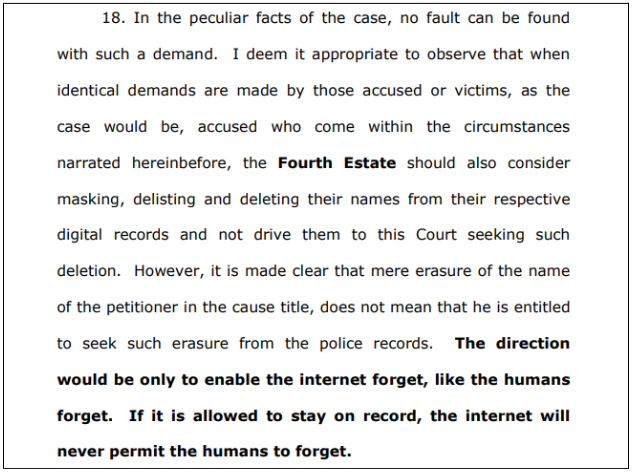
Karnataka HC: Divorced Husband cannot be allowed to create artificial deductions to provide less maintenance to Family
In the case of X vs. Y, the Karnataka HC was dealing with the petition filed against the order of the Family Court. The facts of the case were that Husband ‘X’ and Wife ‘Y’ were married and bore a girl child. Subsequently, they are divorced, owing to the cruel treatment of the wife by the husband. The family court ordered a maintenance amount of Rs. 15,000 to be paid to the wife for a lifetime or till she remarries and Rs. 10,000 to be paid to the daughter till her marriage, along with the cost of litigation. The husband challenged the maintenance amount award granted by the family court to the wife and child, by claiming that it was too high an amount for him to provide.
When the matter was taken up, the HC noted that the husband is a working employee of the State Bank of India (SBI) and drawing a salary of over 1,00,000 rupees. In contra, the wife does not have any source of income, and the daughter is not married yet. The husband claimed that though he draws a high salary, a lot of it goes into monthly deductions. The court noted that the deductions claimed by the husband are provident fund contribution, house rent recovery, furniture recovery, loan obtained by the husband, LIC premium and festival advance, which are all deductions accruing to the benefit him only and they cannot be considered as deductible in the assessment of maintenance to be given to the family.
If such a claim is allowed to operate, it would result in the creation of artificial deductions, which would then be used to show lesser home take-away salary, to deliberately mislead the courts in such matters. This is evident in the present case where the husband has arranged for 50% of deductions to be made on salary for the sole benefit and to purposefully reduce the amount of maintenance to be paid.
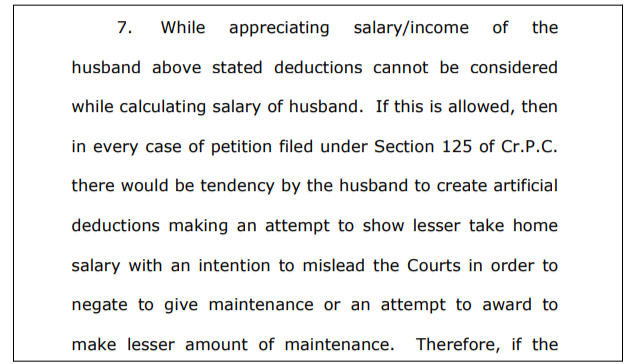
Accordingly, the HC has dismissed the petition and ordered a maintenance amount as awarded by the family court, along with an additional cost of Rs. 15,000 as litigation cost, to be paid to the wife and daughter by the husband.


